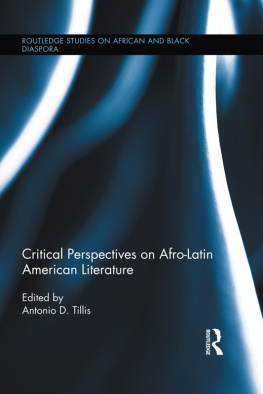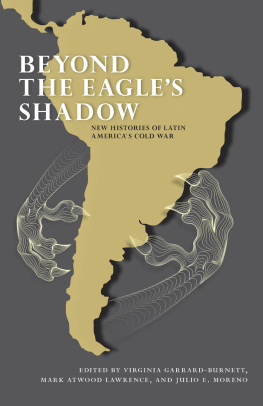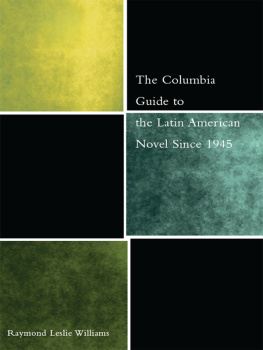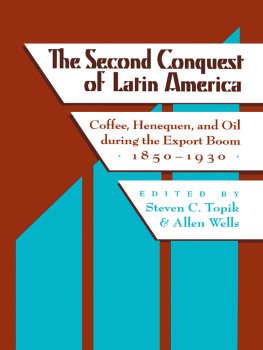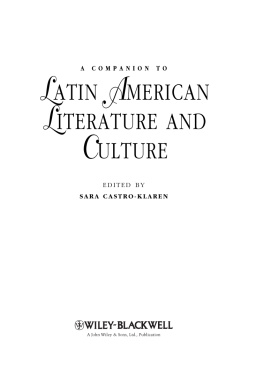Literature and Culture Series
General Editor: Greg Dawes
Series Editor: Ana Peluffo
Other Books Published by Editorial A Contracorriente :
Marisol Montao, Alejandro Solomianski y Sofia Wolhein (eds.), Otras voces. Nuevas identidades en la frontera sur de California (Testimonios)
Ana Peluffo (ed.), Pensar el siglo XIX desde el siglo XXI. Nuevas miradas y lecturas
Andrea Matallana, El Tango entre dos Amricas. La representacin del tango en Estados Unidos, 1910-1939
Carlos Aguirre (ed.), Militantes, intelectuales y revolucionarios. Ensayos sobre marxismo e izquierda en Amrica Latina
The Generation of 72
Latin Americas Forced Global Citizens
Edited by
Brantley Nicholson
University of Richmond
Sophia A. McClennen
Pennsylvania State University
Brantley Nicholson, 2013
Sophia A. McClennen, 2013
All rights reserved for this edition for:
2013, Editorial A Contracorriente
ISBN: 978-0-9853715-4-8
No part of this book, including the cover, may be reproduced without expressed permission from the editor.
Library of Congress Control Number: 2013950780
Library of Congress Cataloging-in-Publication Data:
The Generation of 72 : latin americas forced global citizens / Brantley Nicholson, Sophia A. McClennen.
Raleigh, NC: Editorial A Contracorriente, 2013 / p. cm.
ISBN 10: 0-9853715-4-4
ISBN 13: 978-0-9853715-4-8
Interior design by Samuel F. Sotillo
Illustration on page 42 by Ivette Arends
This work is published under the auspices of the Department of Foreign Languages and Literatures at North Carolina State University .
The Generation of 72 : Latin Americas Forced Global Citizens
Brantley Nicholson
University of Richmond
Sophia A. McClennen
Pennsylvania State University
A very poignant moment stands out in Cristina Peri Rossis La influencia de Edgar A. Poe en la poesa de Raimundo Arenas. In a confrontation between the child narrator and her exiled father, the voice of the child-narrator breaks with the impersonal third person account and delivers an unexpectedly pithy knockout line: Estoy segura de que lo que piensas acerca de nuestra generacin es completamente falso (52). The idea of generational rupture is certainly not a new feature of literary transformation, but there is something in the bold and decisive way that this line is delivered, something in the notion that the father cannot understand his child, that characterizes the break that takes place in the literary generation we refer to in this collection as the Generation of 72. In contrast to the generational testimonies and World Literary schematics that stand on either side of the Generation of 72, there have been no critical collections, definitive testimonies, or telltale autobiographies dedicated to the authors that fall between the Boom and the recently famed anti- Boom : Roberto Bolao and the Generation X that is generally subsumed under the monikers Crack and McOndo . While this group has, at times, been studied as the post-boom or the writers of the postmodern turn, we think that there is value to be added to those approaches by framing this cohort of writers through particular attention to their historical context, one which, we argue, heralded a substantial shift in many of the intellectual practices and political realities that had previously influenced literary work.
The term Generation of 72 is an extrapolation from the framework that Cedomil Goic created in his structuralist reading of the Latin American novel and sweeping analysis of the evolution of Hispanic letters, Mitos degradados (1992).[1] In his formal reading, Goic analyzes literary trends and peaks in Latin American narrative by dividing writers and intellectuals into groups based on the year in which they were born. A group, for Goic, spans fifteen years, and their name is based on the year twenty-three years after the youngest member of a generation was born, presumably around the time that the generations writers would become intellectually and artistically conscious. Within the Novela Contempornea of the twentieth century, for example, the Generacin de 1927 consists of writers born between 1890 and 1904, such as the Boom predecessors in which, Eduardo Mallea, Miguel Angel Asturias, Leopoldo Marechal, Roberto Arlt, Borges, Augustn Ynez, Carpentier, Manuel Rojas, Enrique Amorn son los destacados representantes (231). Following are the two generational tiers of the Boom , the first, the Generacin de 1942, born between 1905 and 1919 consisting of Cortzar, Onetti, Droguett, Bombal, Arguedas, Roa Bastos, and Rulfo, and the second, Generacin de 1957 whose members include, Garca Mrquez, Donoso, Fuentes, and Julio Ramn Ribeyro. While unarguably rigid, Goics framework is useful for exploring Latin American literary trends as collective responses to institutional and historical pressures that affect intellectuals as they mature. Goic, for example, separates Cortzar, Onetti, and Bombal from Garca Marquez and Fuentes, a rare critical division. He considers the urban narratives and neorealista tendencies that exhibit a realismo tradicional and a polmico nacionalismo literario of the former to contrast with the irrealismo of the latter that se distingue por su renovada conciencia de la autonoma de la obra literaria y de la especificidad de la literatura, and whose mundo destaca por la radicalizacin de esa autonoma por el distanciamiento que lo extrao, fantstico o grotesco, proporciona al mundo narrativo (236).
Goics last generation is the Generacin de 1972, whose writers were born between 1935 and 1949. While he offers early candidates for his Novissimi NarratoresVargas Llosa, Severo Sarduy, Reinaldo Arenas and Alfredo Bryce Echeniquejudging by the one brief paragraph that he dedicates to this generation, it was too early to give the group a fleshed out reading or to successfully indicate which authors would leave their mark on the region or the world. And the formal characteristics that he uses to classify them are not as developed as they could be. Neither entirely off the mark, nor fully descriptive of the Generacin de 1972, he writes that their disposicin narrativa envuelve dos trminos contrapuestos: uno de rgida y simtrica construccin, con otro de fluidez y movilidad en el montaje de tiempos y espacios diversos, and that they, ilustran sectores sociales y humanos en su variedad y complejidad con ambiciosa contemplacin de totalidad (238).
Goics preliminary understanding of post- Boom literature seems to affirm Donald Shaws in depth theorization of a similar generation and their return to a realism that ponders sociopolitical totalities. For Shaw, whose post- Boom writers are typified by Antonio Skrmeta, Rosario Ferr, and Gustavo Sainz, there is a formal breach between Goics irrealistas and the Generacin de 1972 that has as much to do with the political reality of the time as any attempt to formally rebel against their predecessors. The Pinochetazo in Chile, as he puts it, along with the Guerra Sucia around the River Plate, the insurrections in Central America, the massacre at Tlateloco in 1968, and rising feminist discourses in Europe and the Americas, induce a break with both the glossy social distancing that had come to exemplify Boom literature and the stereotypical and voiceless female characters that had filled its pages.[2]
In theoretical and social terms, Idelber Avelar gets more specific about post- Boom writers, describing the group as intellectuals confronted with the doubly arduous task of finding a formal voice in an editorial economy steeped in the style of the Boom giants, on one front, and faced with the political realities of a wave of dictatorships and economic shock treatment amidst which they come of age, on the other. It is a generation that, for the first time in twentieth-century Latin America, experiences the roundly negative aspects of globalization and whose writers make less voluntary trips to the cosmopolitan center than enter into acquiesced global citizenship through political exile. The battles of writers that for Avelar include Ricardo Piglia, Diamela Eltit, Silviano Santiago, and Tununa Mercado are both formal and political. They attempt to consolidate a voice that will capture the violence experienced in the seventies and eighties, while seeking out what Shoshana Felman and Dori Laub would refer to as an authentic listener through literature.


